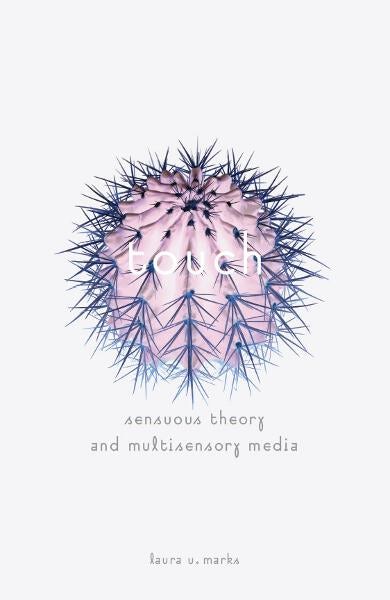Laura U. Marks: Touch: Sensuous Theory and Multisensory Media (2002)
Filed under book | Tags: · ascii, experimental film, feminism, film, net art, performance art, pornography, video art, voyeurism

“In Touch, Laura U. Marks develops a critical approach more tactile than visual, an intensely physical and sensuous engagement with works of media art that enriches our understanding and experience of these works and of art itself.
These critical, theoretical, and personal essays serve as a guide to developments in nonmainstream media art during the past ten years-sexual representation debates, documentary ethics, the shift from analog to digital media, a new social obsession with smell. Marks takes up well-known artists like experimental filmmaker Ken Jacobs and mysterious animators the Brothers Quay, and introduces groundbreaking, lesser-known film, video, and digital artists.
From this emerges a materialist theory-an embodied, erotic relationship to art and to the world. Marks’s approach leads to an appreciation of the works’ mortal bodies: film’s volatile emulsion, video’s fragile magnetic base, crash-prone Net art; it also offers a productive alternative to the popular understanding of digital media as “virtual” and immaterial. Weaving a continuous fabric from philosophy, fiction, science, dreams, and intimate experience, Touch opens a new world of art media to readers.”
Publisher University of Minnesota Press, Oct 2002
ISBN 0816638896, 9780816638895
288 pages
PDF (updated on 2024-11-26)
Comment (0)Lorenzo Chiesa, Alberto Toscano (eds.): The Italian Difference: Between Nihilism and Biopolitics (2009)
Filed under book | Tags: · anthropology, biopolitics, communism, critique, democracy, feminism, italy, nihilism, philosophy, politics, social movements

This volume brings together essays by different generations of Italian thinkers which address, whether in affirmative, problematizing or genealogical registers, the entanglement of philosophical speculation and political proposition within recent Italian thought. Nihilism and biopolitics, two concepts that have played a very prominent role in theoretical discussions in Italy, serve as the thematic foci around which the collection orbits, as it seeks to define the historical and geographical particularity of these notions as well their continuing impact on an international debate. The volume also covers the debate around ‘weak thought’ (pensiero debole), the feminist thinking of sexual difference, the re-emergence of political anthropology and the question of communism. The contributors provide contrasting narratives of the development of post-war Italian thought and trace paths out of the theoretical and political impasses of the present—against what Negri, in the text from which the volume takes its name, calls ‘the Italian desert’.
Contents
Antonio Negri, ‘The Italian Difference’
Pier Aldo Rovatti, ‘Foucault Docet’
Gianni Vattimo, ‘Nihilism as Emancipation’
Roberto Esposito, ‘Community and Nihilism’
Matteo Mandarini, ‘Beyond Nihilism: Notes Towards a Critique of Left-Heideggerianism in Italian Philosophy of the 1970s’
Luisa Muraro, ‘The Symbolic Independence from Power’
Mario Tronti, ‘Towards a Critique of Political Democracy’
Alberto Toscano, ‘Chronicles of Insurrection: Tronti, Negri and the Subject of Antagonism’
Paolo Virno, ‘Natural-Historical Diagrams: The ‘New Global’ Movement and the Biological Invariant’
Lorenzo Chiesa, ‘Giorgio Agamben’s Franciscan Ontology’
Publisher: re.press, Melbourne, July 2009
ISBN 0980544076, 9780980544077
Transmission series
Creative Commons BY-NC-ND 2.5 license
180 pages
Sarah Kember: Cyberfeminism and Artificial Life (2003)
Filed under book | Tags: · artificial life, cyberfeminism, cyborg, ethics, feminism, life, posthumanism, wetware

Cyberfeminism and Artificial Life examines construction, manipulation and re-definition of life in contemporary technoscientific culture. It takes a critical political view of the concept of life as information, tracing this through the new biology and the changing discipline of artificial life and its manifestation in art, language, literature, commerce and entertainment. From cloning to computer games, and incorporating an analysis of hardware, software and ‘wetware’, Sarah Kember demonstrates how this relatively marginal field connects with, and connects up global networks of information systems.
As well as offering suggestions for the evolution of [cyber]feminism in Alife environments, the author identifies the emergence of posthumanism; an ethics of the posthuman subject mobilized in the tension between cold war and post-cold war politics, psychological and biological machines, centralized and de-centralized control, top-down and bottom-up processing, autonomous and autopoietic organisms, cloning and transgenesis, species-self and other species. Ultimately, this book aims to re-focus concern on the ethics rather than on the ‘nature’ of life-as-it-could-be.
Publisher Routledge, 2003
ISBN 0415240263, 9780415240260
257 pages
Keywords and phrases
evolutionary psychology, epistemology, ALife, sociobiology, autopoiesis, posthuman, cyberfeminism, norns, Steve Grand, science wars, SimLife, feminism, ontology, SimEarth, Risan, natural selection, cyborg, connectionism, feminist, autonomous agents
PDF (updated on 2013-3-16)
Comments (2)
